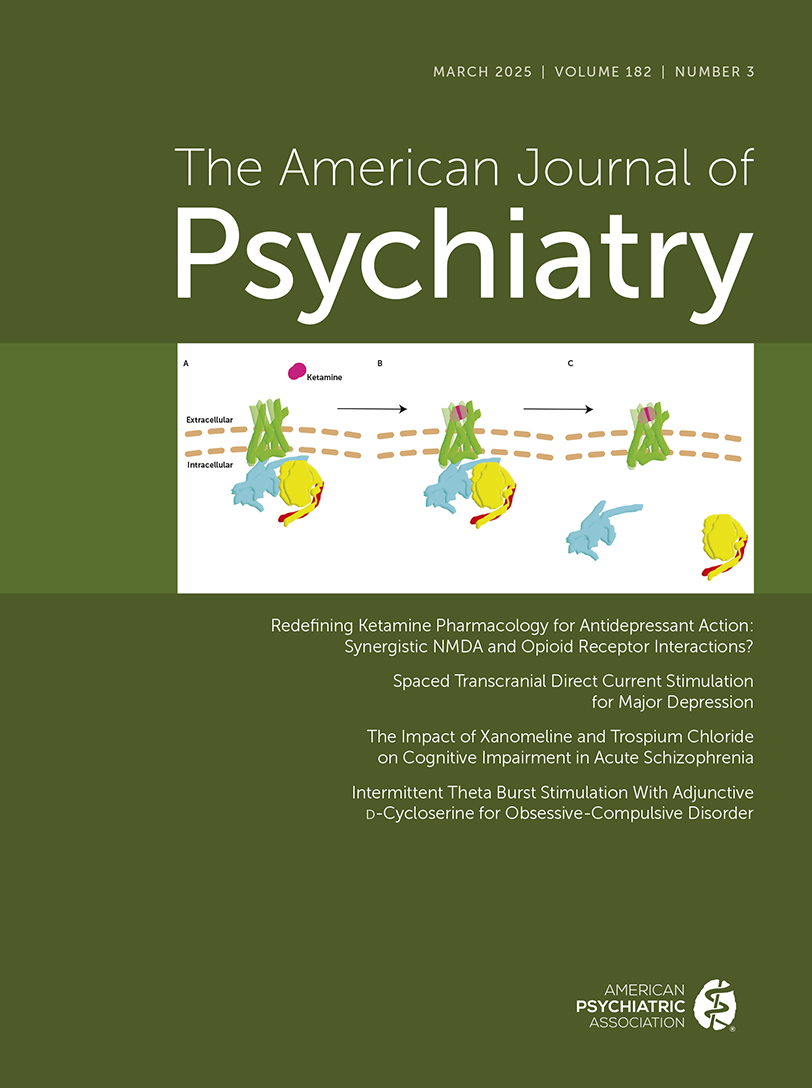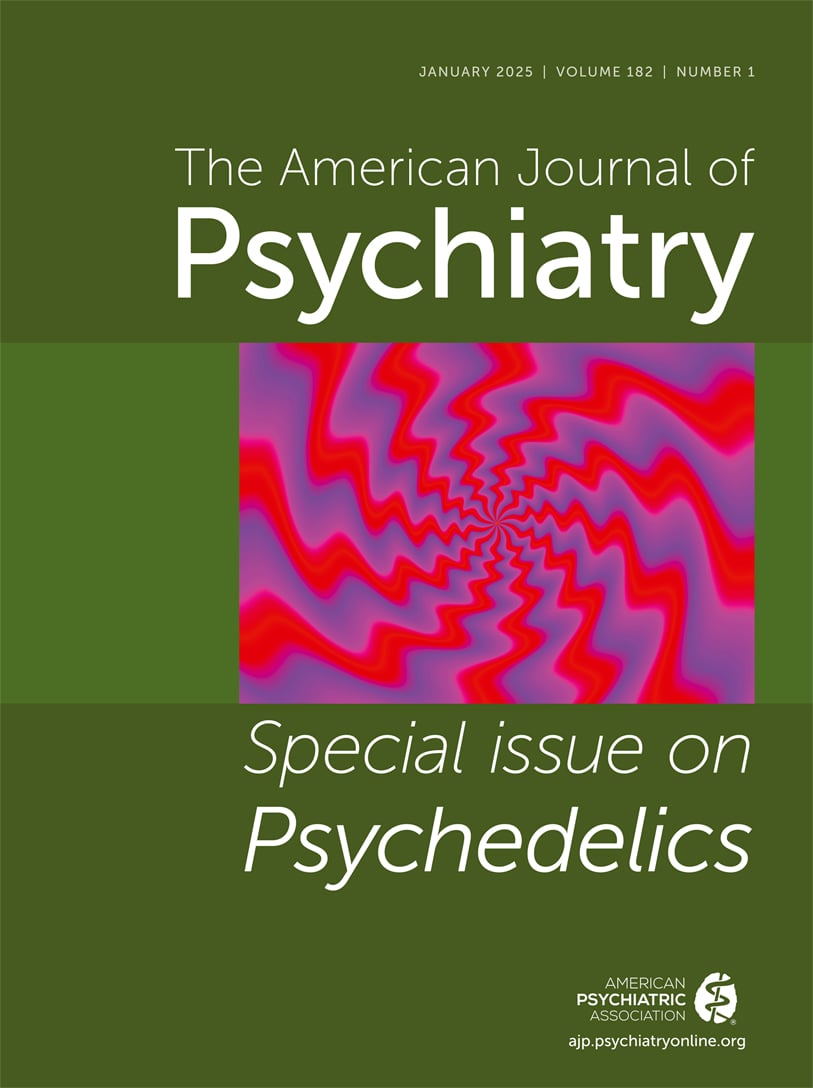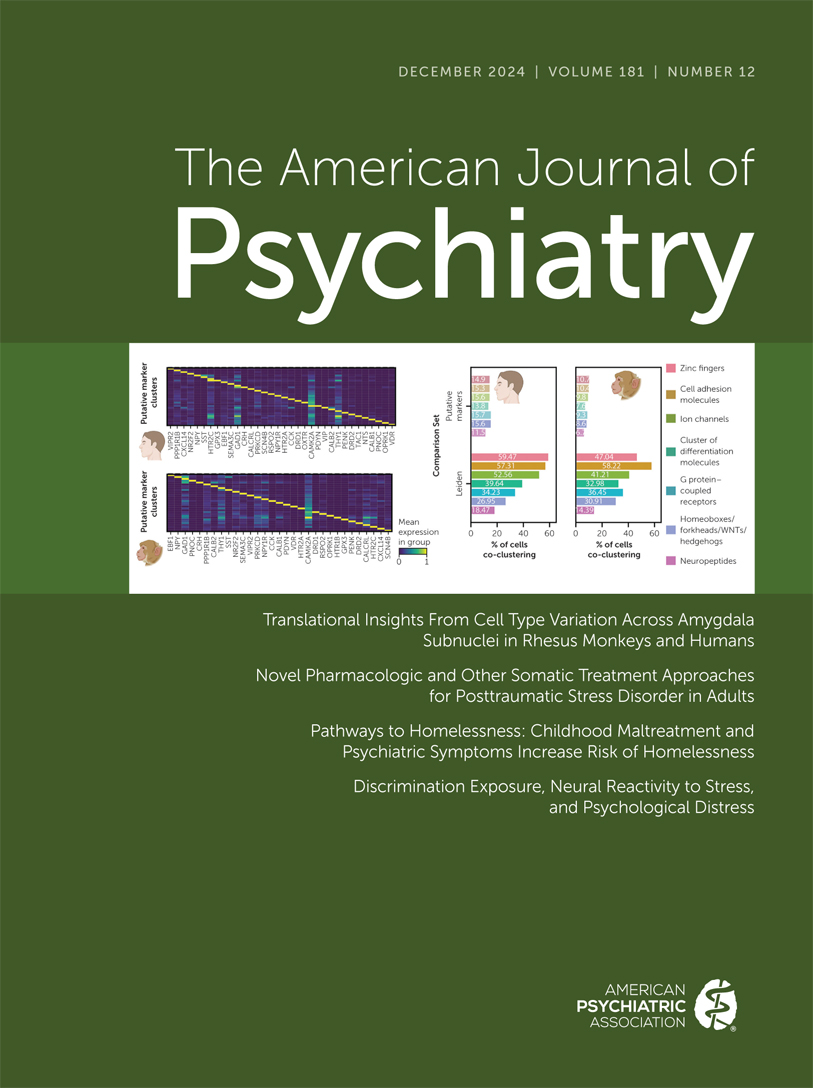American Journal of Psychiatry
- Volume 161
- Number 9
- September 2004
In This Issue
Editorial
Reviews and Overviews
Publication date: 01 September 2004
Pages1537–1547OBJECTIVE: This study reviewed the evidence from randomized, controlled trials on the efficacy and safety of antidepressants in the short-term treatment of bipolar depression. METHOD: The authors performed a systematic review and meta-analysis of ...
https://doi.org/10.1176/appi.ajp.161.9.1537Publication date: 01 September 2004
Pages1548–1557OBJECTIVE: Although maternal infanticide is a rare event, a high proportion of cases occurs in the context of postpartum mental illness. The author reviews historical, legislative, and contemporary psychiatric perspectives on infanticide and discusses ...
https://doi.org/10.1176/appi.ajp.161.9.1548Publication date: 01 September 2004
Pages1558–1563OBJECTIVE: Three domains of ethical conduct outlined in the U.S. Food and Drug Administration’s 1998 Belmont Report on protection of human research subjects—respect for persons, beneficence, and justice—have posed specific dilemmas in the design of ...
https://doi.org/10.1176/appi.ajp.161.9.1558Images in Neuroscience
Introspections
Clinical Case Conference
Images in Psychiatry
Article
Publication date: 01 September 2004
Pages1575–1580OBJECTIVE: With a multitude of antidepressants available, predictors of response to different classes of antidepressants are of considerable interest. The purpose of the present study was to determine whether norepinephrine transporter gene (NET) and ...
https://doi.org/10.1176/appi.ajp.161.9.1575Publication date: 01 September 2004
Pages1581–1587OBJECTIVE: The authors examined the sources of covariation between generalized anxiety disorder and the personality trait of neuroticism. Because women have higher levels of neuroticism and twice the risk of lifetime generalized anxiety disorder of men, ...
https://doi.org/10.1176/appi.ajp.161.9.1581Publication date: 01 September 2004
Pages1588–1594OBJECTIVE: The association between maternal depression and offspring dysfunction is well documented; however, little attention has been paid to psychopathology in the partners of these depressed mothers or to how paternal psychopathology might influence ...
https://doi.org/10.1176/appi.ajp.161.9.1588Publication date: 01 September 2004
Pages1595–1602OBJECTIVE: There has been consistent evidence for a lower incidence and milder course of schizophrenia in women, yet there have been very few investigations of sex differences in brain function in this disorder. This study used a new high-temporal-...
https://doi.org/10.1176/appi.ajp.161.9.1595Publication date: 01 September 2004
Pages1603–1611OBJECTIVE: The middle temporal gyrus and inferior temporal gyrus subserve language and semantic memory processing, visual perception, and multimodal sensory integration. Functional deficits in these cognitive processes have been well documented in ...
https://doi.org/10.1176/appi.ajp.161.9.1603Publication date: 01 September 2004
Pages1612–1619OBJECTIVE: Neuropathological findings regarding the entorhinal cortex in schizophrenia are conflicting. The authors used structural magnetic resonance imaging to examine the entorhinal cortex volumes of healthy subjects and medication-naive patients ...
https://doi.org/10.1176/appi.ajp.161.9.1612Publication date: 01 September 2004
Pages1620–1625OBJECTIVE: Clozapine, the prototype of atypical antipsychotics, remains unique in its efficacy in the treatment of refractory schizophrenia. Its affinity for dopamine D4 receptors, serotonin 5-HT2A receptor antagonism, effects on the noradrenergic system, ...
https://doi.org/10.1176/appi.ajp.161.9.1620Publication date: 01 September 2004
Pages1626–1634OBJECTIVE: The purpose of the study was to evaluate the prevalence and predictors of depression treatment in a diverse cross-national sample of primary care patients. METHOD: At primary care facilities in six countries (Spain, Israel, Australia, Brazil, ...
https://doi.org/10.1176/appi.ajp.161.9.1626Publication date: 01 September 2004
Pages1635–1641OBJECTIVE: Published reports indicate that African Americans are underrepresented among patients treated with ECT. The reason for this disparity in practice has not been determined. This study addressed this question by using existing data on a large ...
https://doi.org/10.1176/appi.ajp.161.9.1635Publication date: 01 September 2004
Pages1642–1649OBJECTIVE: Sertraline’s efficacy and tolerability in treating generalized anxiety disorder were evaluated. METHOD: Adult outpatients with DSM-IV generalized anxiety disorder and a total score of 18 or higher on the Hamilton Anxiety Rating Scale were ...
https://doi.org/10.1176/appi.ajp.161.9.1642Publication date: 01 September 2004
Pages1650–1657OBJECTIVE: Frontostriatal neural abnormalities have been implicated in the response inhibition impairments that are characteristic of attention deficit hyperactivity disorder (ADHD). However, reports of such abnormalities in adolescents are inconsistent. ...
https://doi.org/10.1176/appi.ajp.161.9.1650Publication date: 01 September 2004
Pages1658–1664OBJECTIVE: Training in psychodynamic psychotherapy remains a core requirement of psychiatric residency training programs, yet no standard measures of competency exist to document residents’ knowledge and skills in this area. To address this issue, the ...
https://doi.org/10.1176/appi.ajp.161.9.1658Publication date: 01 September 2004
Pages1665–1671OBJECTIVE: This study examined 1) whether patients with chronic and recurrent anxiety and depressive disorders and/or personality disorders demonstrate improvement in their defense styles with long-term dynamic psychotherapy and 2) what the relationship ...
https://doi.org/10.1176/appi.ajp.161.9.1665Publication date: 01 September 2004
Pages1672–1679OBJECTIVE: Prior studies have found high rates of alcohol use and abuse/dependence, depression, bankruptcy, and incarceration associated with recreational gambling. Despite growing rates of recreational gambling in older adults, little is known regarding ...
https://doi.org/10.1176/appi.ajp.161.9.1672Publication date: 01 September 2004
Pages1680–1691OBJECTIVE: The narrow ICD-10 and DSM-IV definition of hypochondriasis makes it rarely used yet does not prevent extensive diagnosis overlap. This study identified a distinct hypochondriasis symptom cluster and defined diagnostic criteria. METHOD: ...
https://doi.org/10.1176/appi.ajp.161.9.1680Publication date: 01 September 2004
Pages1692–1697OBJECTIVE: The authors aimed to evaluate the adequacy of the reporting of safety information in publications of randomized trials of mental-health-related interventions. METHOD: The authors randomly selected 200 entries from the PsiTri registry of mental-...
https://doi.org/10.1176/appi.ajp.161.9.1692Brief Report
Publication date: 01 September 2004
Pages1698–1700OBJECTIVE: Transmission of the brain-derived neurotrophic factor (BDNF) Val66 allele in children with a prepubertal and early adolescent bipolar disorder phenotype was examined. METHOD: The prepubertal and early adolescent bipolar disorder phenotype was ...
https://doi.org/10.1176/appi.ajp.161.9.1698Publication date: 01 September 2004
Pages1700–1702OBJECTIVE: The 22q11.2 deletion syndrome (DiGeorge/velocardiofacial syndrome) is associated with attentional problems and executive dysfunction, and is one of the highest known risk factors for schizophrenia. These behavioral manifestations of 22q11.2 ...
https://doi.org/10.1176/appi.ajp.161.9.1700Publication date: 01 September 2004
Pages1703–1705OBJECTIVE: The authors assessed the association between the catechol-O-methyltransferase (COMT) Val158Met polymorphism and scores on the phobic anxiety scale of the Crown-Crisp Experimental Index. METHOD: A total of 1,234 women completed the Crown-Crisp ...
https://doi.org/10.1176/appi.ajp.161.9.1703Publication date: 01 September 2004
Pages1705–1708OBJECTIVE: Because glutamate carboxypeptidase II (GCPII) regulates both folate absorption and activation of N-methyl-d-aspartic acid receptors, the authors examined relationships between serum folate concentrations and clinical symptoms in schizophrenia ...
https://doi.org/10.1176/appi.ajp.161.9.1705Publication date: 01 September 2004
Pages1709–1711OBJECTIVE: The purpose of the study was to determine the proportion of patients with schizophrenia with a stable regimen of antipsychotic monotherapy who developed diabetes or were hospitalized for ketoacidosis. METHOD: Patients with schizophrenia for ...
https://doi.org/10.1176/appi.ajp.161.9.1709Publication date: 01 September 2004
Pages1712–1714OBJECTIVE: Lack of insight affects the management of schizophrenia. The interrelationship between lack of insight and illness attributes in patients with schizophrenia who commit violent acts is important and underresearched. METHOD: One hundred fifteen ...
https://doi.org/10.1176/appi.ajp.161.9.1712Letter to the Editor
Book Forum: Mental Health Care and Diagnosis
Book Forum: Neurology
Book Forum: Anxiety/Stress
Book Forum: Women’s Health…and Disorders
Book Forum: Forensic Psychiatry
Book Forum: History
APA Official Actions
Past Issues
View Issues Archive
Vol. 182 | No. 3

Vol. 182 | No. 2

Vol. 182 | No. 1
